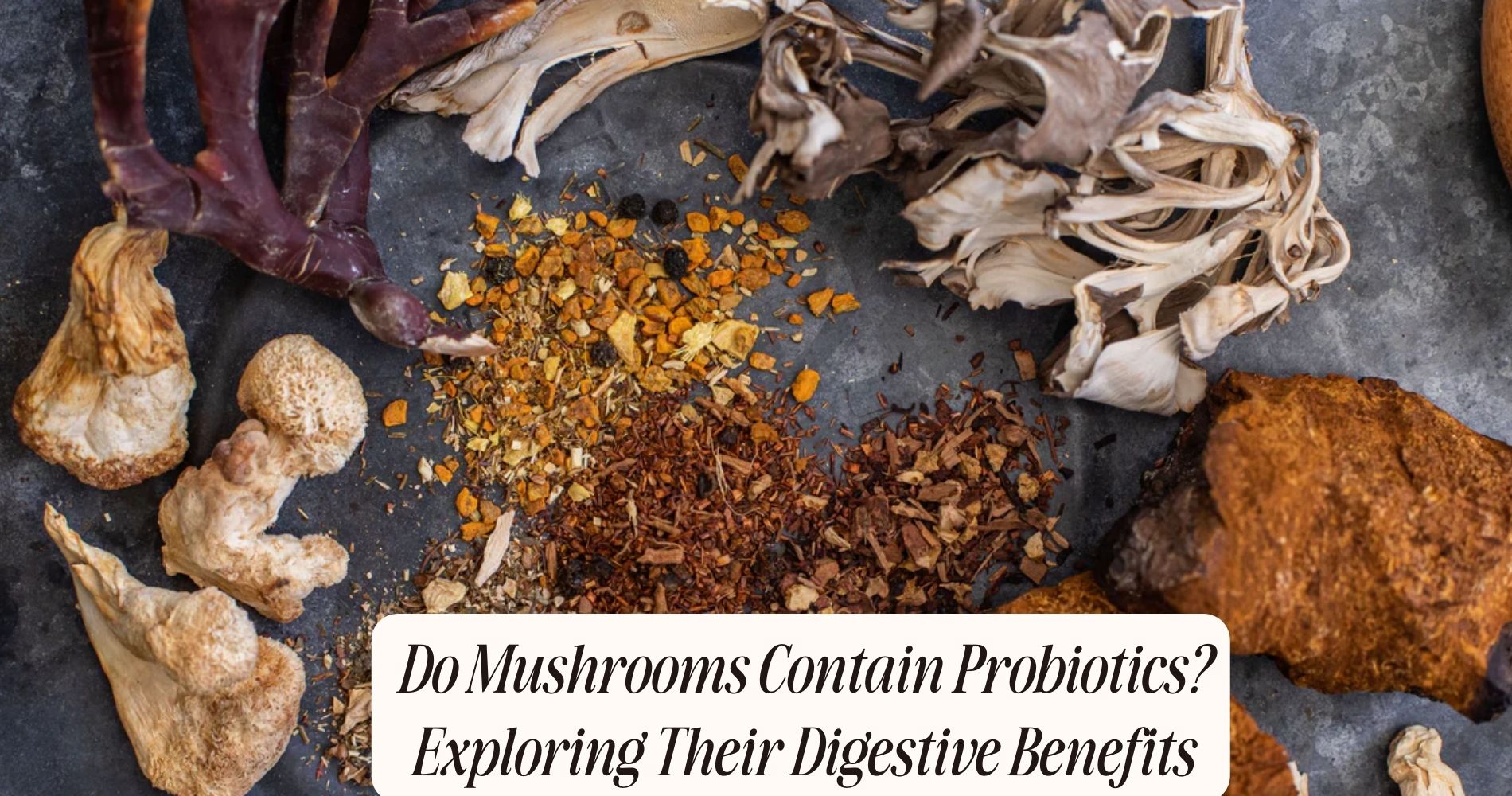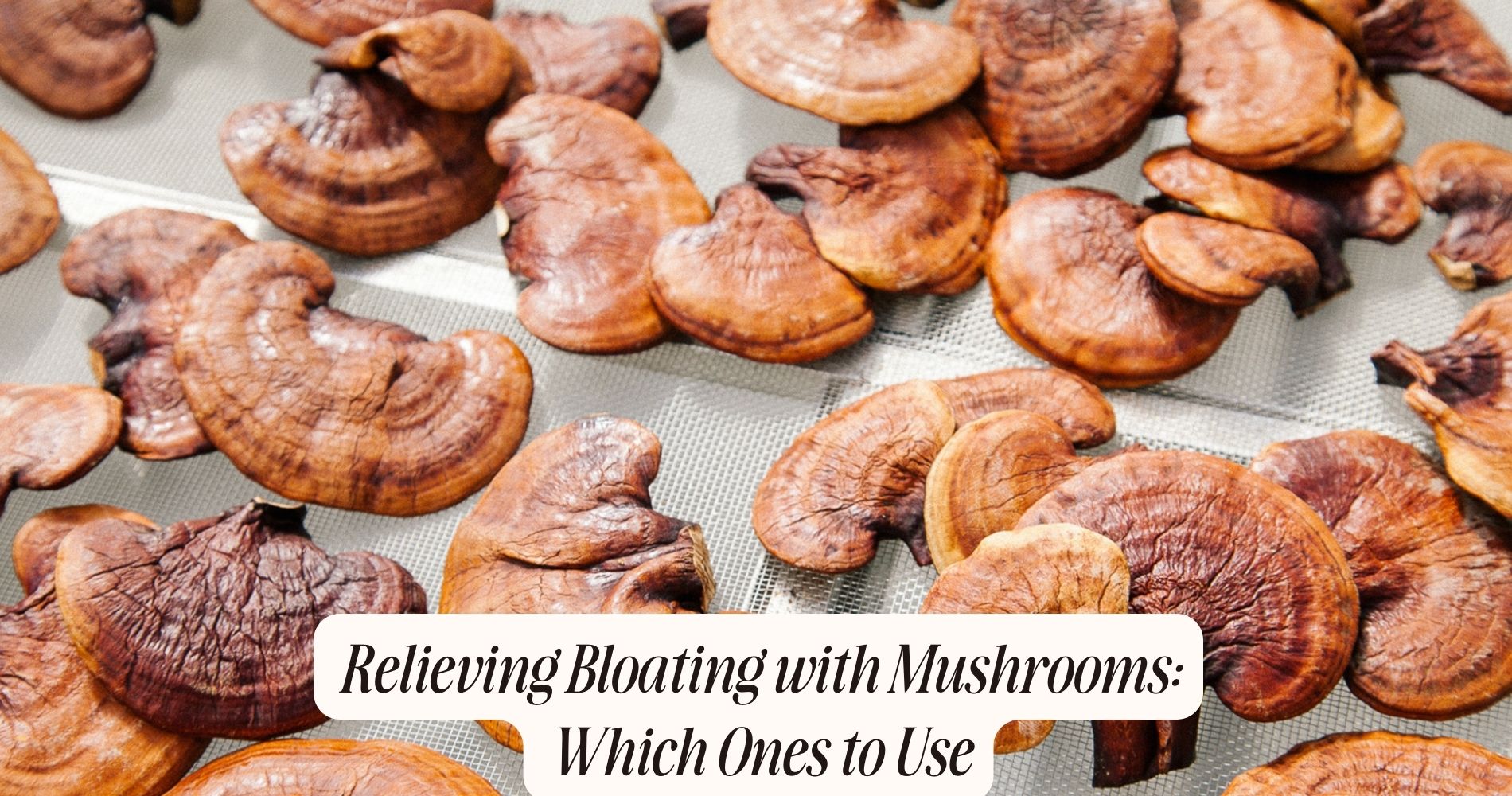
Do Mushrooms Contain Probiotics? Exploring Their Digestive Benefits
Understanding Probiotics
Probiotics, the beneficial bacteria that live in your gut, play an important role in maintaining digestive health and overall well-being. These live microorganisms help balance your gut flora, aiding in nutrient absorption and immune function. The probiotic definition encompasses various strains of bacteria, such as Lactobacillus and Bifidobacterium, known for their health benefits.
Including probiotics in your diet can greatly improve your gut health. These beneficial bacteria work by crowding out harmful bacteria, reducing inflammation, and enhancing your gut's barrier function. Scientific studies have shown that a balanced gut microbiome is linked to improved digestion, better nutrient absorption, and a stronger immune system.
You might wonder how to introduce these beneficial bacteria into your diet. Fermented foods like yogurt, kefir, and sauerkraut are excellent sources of probiotics. It's important to choose products with live and active cultures to reap the maximum benefits. Additionally, probiotic supplements can be a convenient option to make sure you're getting enough of these beneficial bacteria.
Incorporating probiotics into your diet isn't just a trend; it's a scientifically backed approach to boosting your digestive health and overall well-being. By understanding the probiotic definition and recognizing their benefits, you can make informed choices to support your health.
Types of Mushrooms
You'll find that popular edible mushrooms like shiitake, maitake, and button mushrooms offer varied nutritional benefits. Comparing their nutrient profiles helps you choose the best options for digestive health.
For instance, shiitake mushrooms are rich in polysaccharides, which support gut health and immune function.
Popular Edible Varieties
Among the most popular edible varieties, shiitake, button, and portobello mushrooms stand out for their rich nutrient profiles and digestive benefits. Shiitake mushrooms are prized not only for their deep flavor but also their medicinal uses. They contain compounds like lentinan, which has been linked to immune support. When cooking shiitake mushrooms, you can sauté or grill them to bring out their umami flavor, making them a versatile addition to dishes.
Button mushrooms, often the go-to variety in many kitchens, are mild and can be eaten raw or cooked. They're rich in antioxidants like selenium, which aids in protecting your gut lining. Different cooking methods, such as roasting or adding them to soups, preserve their nutrients while enhancing their subtle taste.
Portobello mushrooms, known for their meaty texture, are perfect for grilling and make an excellent substitute for meat in various recipes. They're a good source of fiber, which supports digestive health by maintaining a healthy gut microbiome. Whether you're stuffing them or slicing them into stir-fries, portobellos can elevate your meal while promoting better digestion.
Nutritional Value Comparison
Understanding the distinct nutritional profiles of shiitake, button, and portobello mushrooms can help you make informed choices to optimize your digestive health. Each type offers unique benefits regarding vitamin content and mineral diversity, contributing to your overall well-being.
Shiitake mushrooms are rich in B vitamins, particularly B2 (riboflavin) and B3 (niacin), which support energy metabolism and digestive function. They also contain essential minerals like selenium and zinc, known for their antioxidant properties and immune support. Adding shiitakes to your diet can enhance nutrient absorption and boost digestive health.

Button mushrooms, one of the most common varieties, are excellent sources of vitamin D when exposed to sunlight. This vitamin is essential for calcium absorption and gut health. They also provide a good amount of potassium, which helps maintain electrolyte balance, and phosphorus, key for cellular function. Including button mushrooms in your meals can support a balanced diet and promote gut integrity.
Portobello mushrooms, the mature form of button mushrooms, offer a higher concentration of nutrients. They're packed with fiber, promoting bowel regularity, and are a good source of B vitamins and copper. Their mineral diversity aids in various bodily functions, ensuring your digestive system operates smoothly.
Nutritional Profile
Mushrooms are packed with essential nutrients like vitamins, minerals, and antioxidants that can greatly benefit your overall health. Their impressive vitamin content includes B vitamins such as riboflavin, niacin, and pantothenic acid, which are important for energy production and maintaining healthy skin and nerves.
Additionally, mushrooms are one of the few non-animal sources of vitamin D when exposed to sunlight, helping you maintain strong bones and immune function.
When it comes to their mineral profile, mushrooms are rich in selenium, potassium, and copper. Selenium is an antioxidant that protects your cells from damage, while potassium is essential for heart health and muscle function. Copper aids in forming red blood cells and maintaining healthy bones and nerves. These minerals work together to support various bodily functions and contribute to your overall wellness.
Furthermore, mushrooms contain antioxidants like ergothioneine and glutathione, which can reduce oxidative stress and potentially lower the risk of chronic diseases.
Fiber and Prebiotics
Incorporating mushrooms into your diet can greatly enhance your fiber intake and support a healthy gut microbiome. Mushrooms are a significant source of dietary fiber, which plays an essential role in maintaining digestive health. The fiber in mushrooms acts as a prebiotic, providing nourishment for the beneficial bacteria in your gut. This helps in promoting a balanced gut microbiota, which is vital for excellent digestive function and overall well-being.
Research shows that dietary fiber can increase the diversity and abundance of beneficial gut bacteria. By including mushrooms in your meals, you can contribute to this positive shift in your gut microbiota. Additionally, the prebiotic fibers found in mushrooms, such as beta-glucans, have been shown to stimulate the growth of specific beneficial bacteria, leading to improved gut health.
It's important to remember that a healthy gut microbiome is linked to various aspects of health, including digestion, nutrient absorption, and even mood regulation. So, by adding mushrooms to your diet, you're not just boosting your fiber intake; you're also supporting a thriving gut ecosystem.
This simple dietary change can make a significant difference in your digestive health and overall quality of life.
Immune System Support
You might be surprised to learn that mushrooms can greatly enhance your immune response. Rich in antioxidants, they help combat oxidative stress and support overall health.
Additionally, the connection between gut health and a strong immune system means that mushrooms can play an essential role in keeping you healthy.
Boosting Immune Response
While exploring nutritional benefits, it's evident that certain mushrooms like reishi and shiitake significantly enhance the immune system. These mushrooms act as powerful immune boosters due to their unique compounds. For instance, beta-glucans found in these fungi can stimulate your immune cells, making them more effective at fighting off infections.
Incorporating reishi and shiitake into your diet can help you maintain a robust immune response, potentially reducing the frequency and severity of illnesses.
Furthermore, the fermentation process that some mushrooms undergo can amplify their immune-boosting properties. Fermented mushrooms not only retain their beneficial compounds but also become easier for your body to absorb. This means you get more of the good stuff, like polysaccharides and antioxidants, which support your immune system.
By focusing on fermented varieties, you're maximizing the health benefits these mushrooms offer.
Incorporating these nutrient-dense mushrooms into your meals is a simple, effective way to support your immune health. Whether you choose fresh, dried, or fermented options, making mushrooms a regular part of your diet can provide substantial benefits.

Antioxidant Properties
How do the antioxidant properties of mushrooms play an essential role in supporting your immune system?
Mushrooms are rich in antioxidants like ergothioneine and glutathione, which help neutralize free radicals. Free radicals are unstable molecules that can cause oxidative stress, leading to cell damage and a weakened immune system. By reducing oxidative stress, mushrooms help maintain cellular integrity and support your immune defenses.
When you consume mushrooms, their antioxidants work to protect your cells from the harmful effects of free radicals. This protection is critical for your immune system, as continuous oxidative stress can impair its function, making you more susceptible to infections and diseases. Studies show that the antioxidants found in mushrooms can increase the body's resilience against pathogens.
Moreover, mushrooms are nutrient-dense, offering vitamins like selenium and vitamin D, which further bolster your immune response. Selenium, in particular, plays a key role in antioxidant defense systems, enhancing your body's ability to fend off oxidative stress. Incorporating mushrooms into your diet can be a strategic move to strengthen your immune system, reduce oxidative damage, and promote overall health.
Gut Health Connection
A vital gut microbiome is pivotal for robust immune function, and mushrooms can play a significant role in maintaining this balance. Your gut is home to trillions of microorganisms that influence not just digestion but also your immune system and overall health. By promoting microbiome diversity, mushrooms help guarantee that your gut flora is balanced and thriving.
Mushrooms like shiitake and maitake are rich in polysaccharides, which act as prebiotics. These compounds nourish beneficial bacteria in your gut, fostering a healthy microbiome. A diverse microbiome is essential for a well-functioning immune system because it reduces the prevalence of harmful bacteria and supports the growth of beneficial ones.

Moreover, the gut brain axis—a communication network linking your gut and brain—relies on a balanced microbiome to function optimally. When your gut health is compromised, it can affect your mental well-being and immune response. Including mushrooms in your diet can enhance this axis, supporting both cognitive and immune health.
Incorporating mushrooms into your meals could be a simple yet effective way to boost your gut health. By doing so, you're not just enriching your diet but also supporting a system that plays a critical role in your overall well-being.
Research Findings
Recent studies reveal that incorporating mushrooms into your diet can greatly improve gut health and digestion. Clinical trials have shown that mushrooms can positively influence microbiome changes, enhancing the balance of beneficial bacteria in your gut.
Researchers observed that participants who consumed mushrooms regularly experienced significant shifts in their gut microbiota, leading to improved digestive function and overall well-being.
The high fiber content in mushrooms acts as a prebiotic, providing nourishment for your gut's good bacteria. This fiber helps maintain a healthy digestive tract by promoting regular bowel movements and reducing inflammation.
Additionally, mushrooms are rich in polysaccharides, compounds that have been found to stimulate the growth of probiotics, further supporting digestive health.
Nutrient-wise, mushrooms are a powerhouse. They contain essential vitamins and minerals like B vitamins, selenium, and copper, which are essential for metabolic processes and immune function. These nutrients not only contribute to a healthy gut environment but also support your body's overall health.
Incorporating Mushrooms
Incorporating mushrooms into your diet can be both simple and highly beneficial, thanks to their versatile culinary uses and robust nutrient profile. When considering cooking techniques, you can sauté, grill, or roast mushrooms to enhance their natural flavors.
Sautéing them with a bit of olive oil and garlic can elevate any dish, while grilling mushrooms adds a smoky richness that complements a variety of meals.
Mushrooms are a fantastic source of essential nutrients like B vitamins, selenium, and antioxidants. These nutrients not only support your overall health but can also boost your digestive system. For example, mushrooms contain dietary fiber, which aids in maintaining a healthy gut.
To maximize flavor enhancement, try experimenting with different mushroom varieties. Shiitake, for instance, offers a rich, umami taste that can deepen the flavor of soups and stews. Oyster mushrooms add a subtle, seafood-like flavor, making them perfect for stir-fries and pasta dishes.

Incorporating mushrooms into your meals doesn't have to be complicated. By utilizing various cooking techniques and exploring different varieties, you'll not only enjoy delicious meals but also enrich your diet with valuable nutrients that support digestive health.
Enhance Your Digestive Health with Well Gummies
As you delve into the digestive benefits of mushrooms and their role as prebiotics, consider boosting your wellness regimen with our 10-IN-1 MUSHROOM GUMMIES from Well Gummies. These gummies are an easy and delightful way to incorporate the power of ten functional mushrooms into your daily routine. Crafted for those seeking natural solutions, our vegan gummies are designed to support calmer energy, enhanced focus, and a robust immune system. Enjoy the delicious taste of fresh wild berries, making each gummy as enjoyable as your favorite candy, without any jitters or crashes. Integrate Well Gummies into your diet to maintain a balanced body and a clear mind while leveraging the prebiotic benefits of mushrooms.
Frequently Asked Questions
Can Cooking Methods Affect the Probiotic Content in Mushrooms?
Yes, cooking methods can affect the probiotic content in mushrooms. Shorter cooking durations preserve more nutrients. Fermentation methods can enhance probiotic properties, making them a beneficial addition to a nutrient-focused diet.
Do Mushrooms Interact With Probiotic Supplements or Medications?
When considering mushrooms, you should be aware of potential supplement interaction and medication interference. Although there's limited evidence, consult your healthcare provider before combining mushrooms with probiotic supplements or medications to guarantee safety and efficacy.
Are There Any Known Side Effects of Consuming Mushrooms for Digestive Health?
When consuming mushrooms for digestive health, you might experience digestive discomfort or rare allergic reactions. Be sure to monitor your body's response and consult a healthcare professional if you notice any adverse effects. Prioritize your nutrient intake and well-being.
How Do Mushrooms Compare to Traditional Probiotic Foods Like Yogurt?
When comparing mushrooms to yogurt, mushrooms offer high nutrient density but lack the fermentation process that boosts probiotics. You'll get different benefits, with yogurt providing live cultures essential for gut health, unlike mushrooms.
Can Children Benefit From the Digestive Properties of Mushrooms?
Yes, children can benefit from the digestive properties of mushrooms. These fungi enhance nutrient absorption and provide immune support, making them a valuable addition to your child's diet for overall digestive health and well-being.
Conclusion
You've learned that while mushrooms don't contain probiotics, they offer significant digestive benefits due to their rich fiber and prebiotic content.
Including mushrooms in your diet can aid in gut health, support your immune system, and provide essential nutrients.
Research shows that the unique compounds in mushrooms can enhance your overall well-being.
So, don't hesitate—start incorporating a variety of mushrooms into your meals to reap these impressive health benefits.




